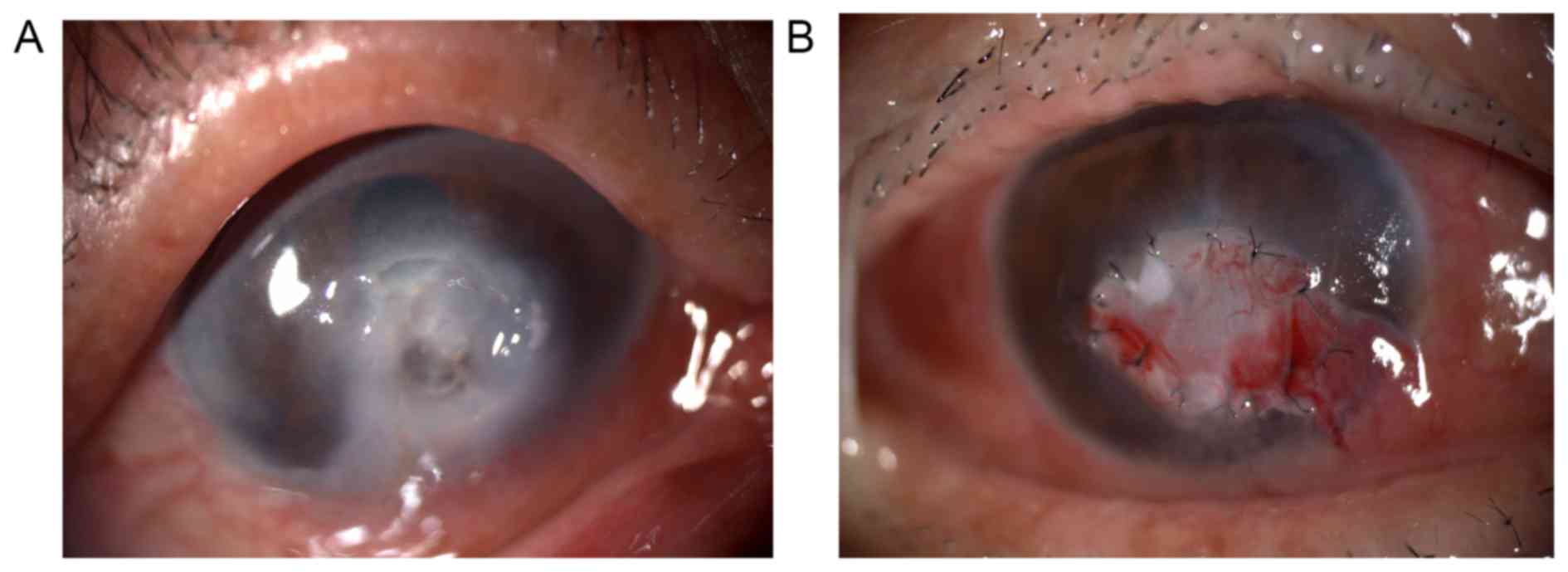|
1
|
Leber TH: Keratomycosis spergillina als
ursache von hypopyonkeratites. Graefes Ach Clin Exp Ophthalmol.
25:285–301. 1879. View Article : Google Scholar
|
|
2
|
Ou JI and Acharya NR: Epidemiology and
treatment of fungal corneal ulcers. Int Ophthalmol Clin. 47:7–16.
2007. View Article : Google Scholar : PubMed/NCBI
|
|
3
|
Gopinathan U, Sharma S, Garg P and Rao GN:
Review of epidemiological features, microbiological diagnosis and
treatment outcome of microbial keratitis: Experience of over a
decade. Indian J Ophthalmol. 57:273–279. 2009. View Article : Google Scholar : PubMed/NCBI
|
|
4
|
Johns KJ and O'Day DM: Pharmacologic
management of keratomycoses. Surv Ophthalmol. 33:178–188. 1988.
View Article : Google Scholar : PubMed/NCBI
|
|
5
|
O'Day DM, Head WS, Robinson RD and Clanton
JA: Corneal penetration of topical amphotericin B and natamycin.
Curr Eye Res. 5:877–882. 1986. View Article : Google Scholar : PubMed/NCBI
|
|
6
|
Kaur IP, Rana C and Singh H: Development
of effective ocular preparations of antifungal agents. J Ocul
Pharmacol Ther. 24:481–493. 2008. View Article : Google Scholar : PubMed/NCBI
|
|
7
|
Kaur IP and Kakkar S: Topical delivery of
antifungal agents. Expert Opin Drug Deliv. 7:1303–1327. 2010.
View Article : Google Scholar : PubMed/NCBI
|
|
8
|
Sony P, Sharma N, Vajpayee RB and Ray M:
Therapeutic keratoplasty for infectious keratitis: A review of the
literature. CLAO J. 28:111–118. 2002.PubMed/NCBI
|
|
9
|
Sandinha T, Zaher SS, Roberts F, Devlin
HC, Dhillon B and Ramaesh K: Superior forniceal conjunctival
advancement pedicles (SFCAP) in the management of acute and
impending corneal perforations. Eye (Lond). 20:84–89. 2006.
View Article : Google Scholar : PubMed/NCBI
|
|
10
|
Dursun D, Fernandez V, Miller D and
Alfonso EC: Advanced fusarium keratitis progressing to
endophthalmitis. Cornea. 22:300–303. 2003. View Article : Google Scholar : PubMed/NCBI
|
|
11
|
Sanitato JJ, Kelley CG and Kaufman HE:
Surgical management of peripheral fungal keratitis (keratomycosis).
Arch Ophthalmol. 102:1506–1509. 1984. View Article : Google Scholar : PubMed/NCBI
|
|
12
|
Khater MM, Shehab NS and El-Badry AS:
Comparison of mycotic keratitis with nonmycotic keratitis: An
epidemiological study. J Ophthalmol. 2014:2543022014. View Article : Google Scholar : PubMed/NCBI
|
|
13
|
Rautaraya B, Sharma S, Kar S, Das S and
Sahu SK: Diagnosis and treatment outcome of mycotic keratitis at a
tertiary eye care center in eastern India. BMC Ophthalmol.
11:392011. View Article : Google Scholar : PubMed/NCBI
|
|
14
|
Bharathi MJ, Ramakrishnan R, Vasu S,
Meenakshi R and Palaniappan R: Epidemiological characteristics and
laboratory diagnosis of fungal keratitis. A three-year study.
Indian J Ophthalmol. 51:315–321. 2003.PubMed/NCBI
|
|
15
|
Chander J and Sharma A: Prevalence of
fungal corneal ulcers in northern India. Infection. 22:207–209.
1994. View Article : Google Scholar : PubMed/NCBI
|
|
16
|
Deshpande SD and Koppikar GV: A study of
mycotic keratitis in Mumbai. Indian J Pathol Microbiol. 42:81–87.
1999.PubMed/NCBI
|
|
17
|
Saha S, Banerjee D, Khetan A and Sengupta
J: Epidemiological profile of fungal keratitis in urban population
of West Bengal India. Oman J Ophthalmol. 2:114–118. 2009.
View Article : Google Scholar : PubMed/NCBI
|
|
18
|
Chung HW and Mehta JS: Fibrin glue for
Gundersen flap surgery. Clin Ophthalmol. 7:479–484. 2013.
View Article : Google Scholar : PubMed/NCBI
|
|
19
|
Gundersen T: Conjunctival flaps in the
treatment of corneal disease with reference to a new technique of
application. AMA Arch Ophthalmol. 60:880–888. 1958. View Article : Google Scholar : PubMed/NCBI
|
|
20
|
Lin DT, Webster RG Jr and Abbott RL:
Repair of corneal lacerations and perforations. Int Ophthalmol
Clin. 28:69–75. 1988. View Article : Google Scholar : PubMed/NCBI
|
|
21
|
Saini JS, Sharma A and Grewal SP: Chronic
corneal perforations. Ophthalmic Surg. 23:399–402. 1992.PubMed/NCBI
|
|
22
|
Hirst LW, Smiddy WE and Stark WJ: Corneal
perforations. Changing methods of treatment, 1960–1980.
Ophthalmology. 89:630–635. 1982. View Article : Google Scholar : PubMed/NCBI
|
|
23
|
Portnoy SL, Insler MS and Kaufman HE:
Surgical management of corneal ulceration and perforation. Surv
Ophthalmol. 34:47–58. 1989. View Article : Google Scholar : PubMed/NCBI
|
|
24
|
Weiss JL, Williams P, Lindstrom RL and
Doughman DJ: The use of tissue adhesive in corneal perforations.
Ophthalmology. 90:610–615. 1983. View Article : Google Scholar : PubMed/NCBI
|
|
25
|
Hirst LW and De Juan E Jr: Sodium
hyaluronate and tissue adhesive in treating corneal perforations.
Ophthalmology. 89:1250–1253. 1982. View Article : Google Scholar : PubMed/NCBI
|
|
26
|
Sharma A, Kaur R, Kumar S, Gupta P, Pandav
S, Patnaik B and Gupta A: Fibrin glue versus
N-butyl-2-cyanoacrylate in corneal perforations. Ophthalmology.
110:291–298. 2003. View Article : Google Scholar : PubMed/NCBI
|
|
27
|
Zeng B, Wang P, Xu LJ, Li XY, Zhang H and
Li GG: Amniotic membrane covering promotes healing of cornea
epithelium and improves visual acuity after debridement for fungal
keratitis. Int J Ophthalmol. 7:785–789. 2014.PubMed/NCBI
|
|
28
|
McGrath LA and Lee GA: Corneal epithelial
debridement for diagnosis and therapy of ocular surface disease.
Clin Exp Optom. 98:155–159. 2015. View Article : Google Scholar : PubMed/NCBI
|
|
29
|
Kenyon KR: Review of surgical strategies
for ocular surface disease. Ocul Surf. 9:164–168. 2011.
|
|
30
|
Jeng BH, Dupps WJ Jr, Meisler DM and
Schoenfield L: Epithelial debridement for the treatment of
epithelial basement membrane abnormalities coincident with
endothelial disorders. Cornea. 27:1207–1211. 2008. View Article : Google Scholar : PubMed/NCBI
|















